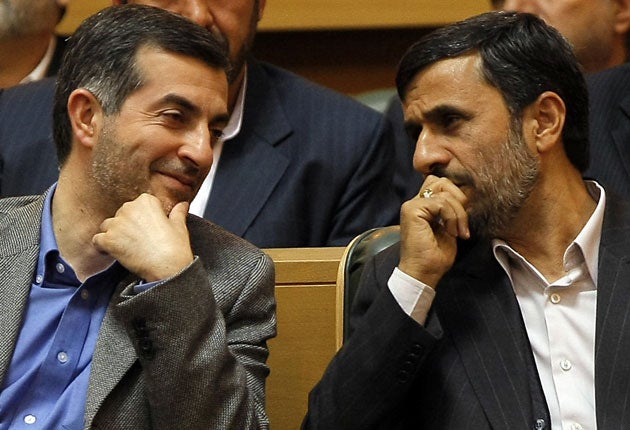Hardliners angry at Ahmadinejad's choice of deputy
President urged to replace Mashaie because of calls to be friends with Israel

Your support helps us to tell the story
From reproductive rights to climate change to Big Tech, The Independent is on the ground when the story is developing. Whether it's investigating the financials of Elon Musk's pro-Trump PAC or producing our latest documentary, 'The A Word', which shines a light on the American women fighting for reproductive rights, we know how important it is to parse out the facts from the messaging.
At such a critical moment in US history, we need reporters on the ground. Your donation allows us to keep sending journalists to speak to both sides of the story.
The Independent is trusted by Americans across the entire political spectrum. And unlike many other quality news outlets, we choose not to lock Americans out of our reporting and analysis with paywalls. We believe quality journalism should be available to everyone, paid for by those who can afford it.
Your support makes all the difference.The Iranian President Mahmoud Ahmadinejad has come under fire from leading hardliners for naming as his top deputy a man who has said Iran is friends with everyone, including with arch-foe Israel.
The state-run, English-language Press TV reported yesterday that Esfandiar Rahim Mashaie "no longer wanted the job" of First Vice-President and had resigned because of the controversy. There was no immediate confirmation of the report.
Analysts say Mr Ahmadinejad's decision to appoint Mr Mashaie, to whom he is related by marriage, suggests the President has only a small entourage of people he trusts.
Iran has 12 vice-presidents, but the First Vice-President is the most important because he leads Cabinet meetings in the absence of the President. Mr Mashaie, whose remarks on Israel in 2008, when he was in charge of a culture and tourism body, created a storm at home, was elevated to that senior rank on Thursday.
Ayatollah Ahmad Khatami, a member of Iran's top legislative body and usually an ally of Mr Ahmadinejad, said the President had shown "a twisted face to clerics and elites" with the appointment. "Ahmadinejad should not challenge conservatives with such decisions. I request the President to replace him before more criticisms are made," the hardline cleric was quoted as saying by the Khorasan newspaper.
Mr Ahmadinejad was re-elected in a June presidential vote which stirred the largest display of unrest that Iran, the world's fifth-bargest oil exporter, has seen since the 1979 revolution. The vote exposed deep rifts in the country's ruling elite. Defeated moderate candidates claim it was rigged in favour of the incumbent, who has described it as "the world's freest election".
The latest criticism comes as a reminder that while hardliners have supported Mr Ahmadinejad in the election dispute, before that vote they often criticised him, especially over his handling of the economy. A hardline editor seen as close to Iran's top authority is among those questioning Mr Ahmadinejad's choice of First Vice-President. It "brought shock, regret and concern to his voters", said Hossein Shariatmadari, the editor-in-chief of the hardline Kayhan daily, calling on the President to reverse his decision. The last row over Mr Mashaie ended after the Supreme Leader, Ayatollah Ali Khamenei, intervened, saying his remarks about Israel were "not right but the dispute should end".
In November, Mr Mashaie came under fire for hosting a ceremony in which women in traditional dress carried in the Koran, to music – an action deemed insulting to the Islamic text.
A lawmaker and Ahmadinejad ally, Hamid Rasai, said Iranian society was very sensitive about Mr Mashaie. "I believe it would have been better if he had not been appointed," the Etemad-e Melli newspaper quoted him as saying. Dariush Ghanbari, a pro-reform lawmaker, told the same newspaper that the President could be impeached over the appointment. However, analysts said this was unlikely as parliament was dominated by hardliners.
*Iran has released a local British embassy employee, Hossein Rassam, on £60,000 bail. He was the last employee still in detention after nine Iranian British embassy staff were held late last month for alleged involvement in mass street protests following the election.
Join our commenting forum
Join thought-provoking conversations, follow other Independent readers and see their replies
Comments